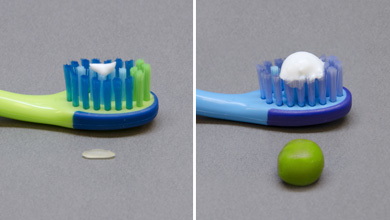|
|
Baby Teeth Matter Third
Ward Dental has assembled the latest
news affecting your baby's dental health here for
your convenience.
If
you have any questions, please don't
hesitate to contact us.
-
Start
performing oral hygiene procedures
daily on day one!

Start by using gauze or a washcloth to
wipe the gum tissue of your newborn
every day. As the baby teeth erupt,
start using a child-size toothbrush,
no toothpaste yet. We want the baby to
know that EVERY DAY, oral hygiene
procedures will occur. As of February
2014, it is recommended that parents
brush their children's teeth
with fluoride
toothpaste as soon as the first tooth
comes in. This new guidance expands
the use of fluoride toothpaste for
young children.
To help prevent
children’s tooth decay, the CSA
recommends that caregivers use a smear
of fluoride toothpaste (or an amount
about the size of a grain of rice) for
children younger than 3 years old and
a pea-size amount of fluoride
toothpaste for children 3 to 6 years
old.
Children do not have the hand
skills to effectively remove plaque
until somewhere around age 6, so it
remains the parents' job to make sure
all of the teeth get brushed
thoroughly, until the child can write
their name in cursive or tie their
shoe laces.

-
For
children younger than 3 years,
caregivers should begin brushing
children’s teeth as soon as they
begin to come into the mouth by
using fluoride toothpaste in an
amount no more than a smear or the
size of a grain of rice (Figure).
Brush teeth thoroughly twice per
day (morning and night) or as
directed by a dentist or
physician. Supervise children’s
brushing to ensure that they use
the appropriate amount of
toothpaste.
-
For
children 3 to 6 years of age,
caregivers should dispense no more
than a pea-sized amount (Figure)
of fluoride toothpaste. Brush
teeth thoroughly twice per day
(morning and night) or as directed
by a dentist or physician.
Supervise children’s brushing to
minimize swallowing of toothpaste.
-
It
is especially critical that
dentists provide counseling to
caregivers that involves the use
of oral description, visual aids
and actual demonstration to help
ensure that the appropriate amount
of toothpaste is used.
-
Never put your
baby to sleep with a bottle, unless it
is filled ONLY with water.
Be sure to give only breast milk,
formula or water in the bottle.
Never put juice, soda, or other sweet
drinks in the baby bottle.
If you
use a pacifier, do not dip it in
anything sweet like sugar or honey.
-
Baby's first visit should be at age 1,
or 6 months after the first tooth
erupts, whichever is earlier.
This visit is an
opportunity to make sure the baby
teeth are healthy; to check on how the
parents are doing with oral hygiene
procedures; to catch any problems
early, when they are easy to fix; and
to give the baby a dental home. You
hold your baby the whole time!
We
also look at baby's airway and tongue
function, which can have serious
effects on growth and development.
-
Breastfeeding is the first choice for
feeding your baby.
-
If you need to use formula for your
baby, use non-fluoridated water to mix
the formula until your baby is 6
months old.
Most bottled water does not contain
fluoride. If your baby is getting all
of his or her nutrition from formula,
they might get too much fluoride
because their entire diet is liquid.
Too much fluoride can cause the teeth
to have mottled enamel, which is
usually a slight discoloration.
More information
-
After 6 months,
the best water for your baby is
fluoridated water. Milwaukee tap water
is optimally fluoridated.
Most bottled water does not contain
fluoride. Using Milwaukee tap water is
better for your baby's teeth and costs
much less than bottled water. Lake
Michigan water has 0.3 ppm naturally,
Milwaukee boosts the fluoride content
to 0.7 ppm, as recommended by the
Department of Health and Human
Services.
-
Tooth Healthy Snacks for Children
-
More Information:
-
Something to Smile About
From the
Wisconsin Department of Public Health.
The pictures on this page are from
this site.
-
Community Water Fluoridation
From the Centers
for Disease Control and Preventions
-
Fluoridation Facts
From the
American Dental Association. For most
cities, every $1 invested in water
fluoridation saves $38 in dental
treatment costs.
Dr. Moser
testified at the Milwaukee Common
Council meeting on 5/31/2012, when
Alderman Bohl wanted to remove
fluoride from Milwaukee's water.
Video Dr. Moser starts at
356:50. This was a 7 hour meeting!
-
Milwaukee Water Information
From the
Milwaukee Water Works. FAQs - Water
Quality and Public Health
-
Well Water Testing
From the
Wisconsin State Laboratory of Hygiene.
Homeowner Package ($309) or Fluoride
test ($26) will give you the
information about the amount of
Fluoride in your water.
-
Baby Teeth Matter
"Baby Teeth
Matter" promotes the promotes the
importance of good oral health during
a child’s early years. This link takes
you to the Wisconsin Dental
Association web site.

|
|
|
|